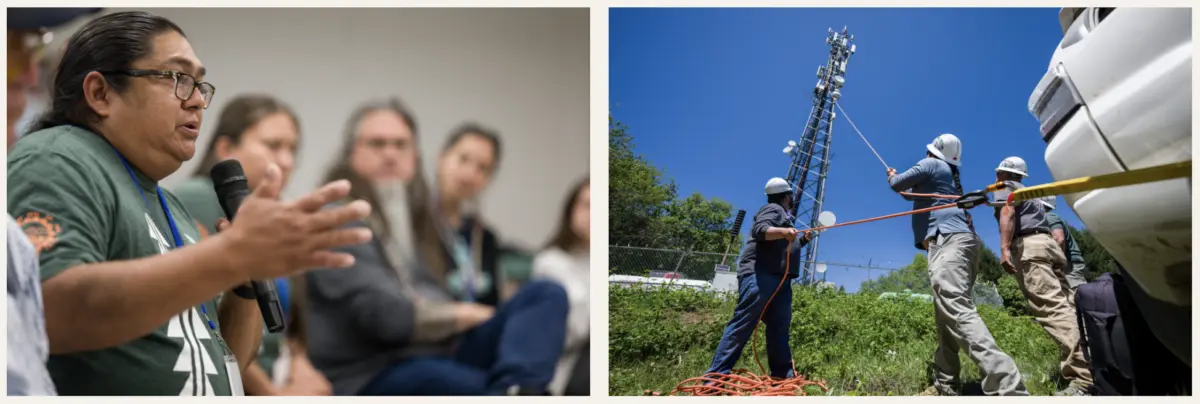- About
- Network
- Community
- Initiatives
- News
- Events
- Blog
- Publications

CENIC Members Bolster the Economy by Expanding Digital Literacy in California
Categories CSU Libraries Equity & Access Tribal
As California continues its work to expand access to broadband connectivity for its communities, parallel work is taking place within those communities to ensure that people have the skills needed to get online and make the most of that connectivity.
Surveys by the National Skills Coalition estimate that more than 90% of today’s jobs require applicants to have some level of digital or online proficiency, yet nearly 30% of U.S. working-age adults lack the skills to fulfill those roles.
Members of the Corporation for Education Network Initiatives in California (CENIC) are working to improve those numbers, both by supporting initiatives aimed at creating digital access for more Californians and by creating programs to enhance digital literacy once those people have been connected.

California State University Sacramento Leads Broad Program on Digital Literacy
In 2023, CSU Sacramento recognized that its computer-literate students could be an asset to address the digital divide for a number of the residents of the surrounding region. Working with the civic leadership organization Valley Vision, college leaders applied for a National Telecommunications and Information Administration (NTIA) grant to develop a digital literacy program for an area of significant need.
“During the pandemic, Sacramento State recognized that the Lemon Hill neighborhood in Sacramento faced significant challenges in accessing the Internet for remote work and school. This project has aimed to support the community in overcoming these issues,” said Guillermo Duran, who leads the Sacramento State project called the Connecting Minority Communities Pilot Program.
By March 2024, the project was underway, with Digital Navigator student interns working in multiple community-based organizations to increase resident comfort with and understanding of computers, applications, the Internet, and other assets in the digital world. The student interns have worked with more than 800 Lemon Hill residents through courses, outreach at farmers’ markets, and the distribution of tech devices when needed.
“Some classes are focused on the most basic of skills, like powering on and off a device,” said Duran. “And by the time the course ends, some have learned to format a resume, manage virtual health care visits, and are ready to explore AI.”
The NTIA grant drew a number of local participants to the program, including Boys and Girls Clubs, Cosumnes River College, Sacramento City College, and a number of neighborhood centers.
“This project involved a broad coalition of community groups in the capital region,” said Trish Kelly, Valley Vision’s managing director. “There are so many other neighborhoods whose residents could benefit from a project like this to expand their digital literacy skills.”
The grant was a time-limited award spanning 2023–2025, with funding set to conclude in November 2025. However, organizers are seeking creative ways to keep the initiative alive for Sacramento.

Libraries Help Build Digital Literacy
Public libraries have long recognized that Digital Navigator programs work best when they involve those with a deep pre-existing understanding of the communities served. This is why many California libraries deploy a range of professionals trained to assist patrons in getting online and acquiring digital skills, including social workers and college students eager for what may be their first opportunity to give back to their communities.
During CENIC’s most recent biennial conference, a panel of experienced library and policy experts discussed the opportunities and challenges faced by Digital Navigators in expanding broadband access throughout the state.
“Digital Navigators are your entry point to learning those things you didn’t know happened on the Internet,” Jarrid Keller, Deputy Director of the Sacramento Public Library, explained.

Tribal Broadband Bootcamps Provide Infrastructure-Related Digital Literacy
In Southern California, some of the broadband needs of Tribal communities have been addressed by a connection between the Tribal Digital Village Network (TDVNet) and CENIC’s statewide fiber-based, high-performance backbone via the Pacific Wave international distributed peering infrastructure, providing TDVNet with extremely cost-effective backhaul connectivity. This connectivity allows TDVNet’s constituent networks to scale and support Tribal communities with affordable solutions and connections to resources for education and innovation that they could not otherwise access.
However, there remain major obstacles to dedicated Tribal broadband infrastructure throughout California. Constructing, testing, permitting, obtaining licenses, and equipment benchmarking require a high level of expertise to navigate for the unique needs of each Tribal community. Sharing expertise on managing these obstacles is of particular value for the widely dispersed Tribes across the state, which are a key benefit of the Tribal Broadband Bootcamp’s three-day workshops.
The Bootcamps provide an invaluable opportunity for learning and expertise sharing among Tribal networking experts, significantly affecting Tribal broadband access and adoption in California and beyond.
Although nearly $1 million in federal funding was pulled from this program earlier this year, the Southern California Tribal Chairmen’s Association innovative director of technology, Matt Rantanen, worked to develop a clever strategy to replace the funding.
“We worked with the Institute for Local Self-Reliance and were able to reclaim nearly 60% of the federal dollars,” said Rantanen. “We’ve also found that foundations are stepping up, as they recognize the importance of connecting Tribes to the power of broadband and have successfully achieved funding to support the bootcamps.”
Bootcamp attendees, regardless of their experience levels, interact with network operators, industry professionals, and broadband experts who walk them through what it takes to build a network and run an Internet Service Provider (ISP). Since 2021, the camps have trained more than 450 people from 85 California Tribes.
CENIC supports initiatives such as these to enable members to collaborate toward common goals—advancing digital access and literacy across California—for the benefit of all Californians. This article is part of a human network series that details how CENIC and its members are working to build a connected California.
Related blog posts
CENIC and San Diego Supercomputer Center Create Sustainable Agriculture for California’s Future
CENIC’s networking and services, including CENIC AIR, can be a vital part of preparing new generations of farmers that will apply the latest technology to agriculture by turning the farm into an educational setting and improving the efficiency of farming as a career.
The Big Game Is Big Data: How CENIC and the California Research and Education Network Support Member Athletics
When Fresno State needed to connect to Pac-12 Enterprises to broadcast a live football game over CBS, the Chancellor's Office reached out to CENIC for what Pac-12 later called the smoothest turn-up they've ever experienced.


